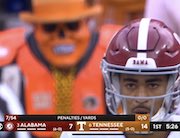|
http://www.newyorker.com/magazine/2014/07/21/wrong-answer The New Yorker had a wonderful article about the scandal itself. Yesterday, many of the teachers were given draconian prison sentences over the scandal. http://www.cnn.com/2015/04/14/us/georgia-atlanta-public-schools-cheating-scandal-verdicts/ 7 years in some cases. There have been a number of commentators cheering, having a hang 'em high attitude, including the judge. But is this truly fair? There is the larger problem of people being effectively punished for asserting their right to a fair trial: accepting a plea for a reasonable sentence but admitting guilt or getting an insane punishment if you lose. But still, if you look at the details, the real villain here was a culture of high stakes testing that created a no win situation for these people dedicated to teaching students. The consequences of failing to make targets, which didn't account for the realities on the ground for disadvantaged children and the schools they went to:the broken families, the history of abuse, the instability in the kid's lives, was mass firings and closing the school down. These schools may have been a pillar of the community in violent neighborhood, that was the only safe place for these kids to go. quote:One afternoon in the spring of 2006, Damany Lewis, a math teacher at Parks Middle School, in Atlanta, unlocked the room where standardized tests were kept. It was the week before his students took the Criterion-Referenced Competency Test, which determined whether schools in Georgia had met federal standards of achievement. The tests were wrapped in cellophane and stacked in cardboard boxes. Lewis, a slim twenty-nine-year-old with dreadlocks, contemplated opening the test with scissors, but he thought his cut marks would be too obvious. Instead, he left the school, walked to the corner store, and bought a razor blade. When he returned, he slit open the cellophane and gently pulled a test book from its wrapping. Then he used a lighter to warm the razor, which he wedged under the adhesive sealing the booklet, and peeled back the tab. I encourage you all to read the rest of the article. It goes on to talk about how there was a culture from the very top that demanded cheating, where people who complained about the cheating were fired, where obviously bogus results were handwaived and now the teachers are going to jail for trying to keep their jobs and their school open. Mandy Thompson fucked around with this message at 21:03 on Apr 15, 2015 |
|
|
|

|
| # ? May 3, 2024 10:40 |
|
Thank you for starting this thread! I think you are incorrectly excusing the actions of the teachers with statements like "the real villain..." and "... just trying to keep their jobs and their school open". I agree that the other groups and structures involved are also to blame and should be held accountable to the same extent as the teachers involved, but that does not absolve these teachers of their crimes. Had they not acted the way they did, it is likely that people would have been fired and schools would have been closed. Now, people have been fired, sent to jail, and schools will likely be closed. They have made the outcomes worse. It is a horrible situation created by poorly designed laws trying to throw a band-aid on the byproducts of a diseased society, but outside of the point you made around sentencing used as punishment for demanding a trial, I do believe it is fair.
|
|
|
|
My question, what was the race of those teachers?
|
|
|
|
My Imaginary GF posted:My question, what was the race of those teachers? Why does it matter?
|
|
|
|
-Troika- posted:Why does it matter? A southern judge handing down a draconian sentence to black "trouble-makers"?  How unusual and unexpected! How unusual and unexpected!
|
|
|
|
-Troika- posted:Why does it matter? I saw "7 years for cheating" and knew instantly they were black. Zeitgueist fucked around with this message at 22:34 on Apr 15, 2015 |
|
|
|
Zeitgueist posted:I saw "7 years for cheating" and new instantly they were black. I hope Obama commutes the sentences of all of them on his way out.
|
|
|
|
Oracle posted:I hope Obama commutes the sentences of all of them on his way out. Well, if you're in a position to bundle and attend a private small dinner for his library, give it a shot and see what he thinks.
|
|
|
|
My Imaginary GF posted:Well, if you're in a position to bundle and attend a private small dinner for his library, give it a shot and see what he thinks.
|
|
|
|
when i was in high school all the kids in the honors math class got caught cheating, the school quickly hushed it up and tried to pretend nothing happened it worked too, everyone got away with it and we had out honors society awards the next day!!
|
|
|
|
I think one of the key parts of the article was this quote:quote:with the passage of the law, teachers were asked to compensate for factors outside their control. He said, “The people who say poverty is no excuse for low performance are now using teacher accountability as an excuse for doing nothing about poverty.” The administrators who have no long-term investment in the community are determined to ignore everything we know about poverty and education in order to improve their own performance: if you can show that you raised test scores X% in a lovely district, you put that on your resume so you can move on to a better position in a cushy district. And of course, the corporate model of education, where test scores are the bottom line, practically forces this perspective where your quarterly performance is all that matters, and long-term planning and patience are punished. Of course, the students are the ones that bear the brunt of this punishment in terms of losing funding, etc., so you've gotta do what you've gotta do, and this occurs everywhere, there's too much at stake to leave it up to the students. I was a teacher and yes, we were encouraged to cheat. Specifically, I had special education students who, due to their IEPs, got to have the questions and possible answers read out loud to them, and so we were told to read the answers like "a. 12, b. 7, c. 15" And if you don't think the wealthier districts are cheating, lol. It's just that high scores there aren't considered anomalous, and they have the social capital to not get it dragged out into the open. Sharkie fucked around with this message at 23:25 on Apr 15, 2015 |
|
|
|
The real reason those students failed the test in the first place isn't that they're hard, it's that they don't give a gently caress. When I had to do standardized testing I would do all the reading and history questions and then bubble in random answers for math and science. Those tests were so boring and irrelevant to my actual education that I could care less. Maybe if they actually went towards your overall grade students would care but to them it's another worthless test they have to take every year.
|
|
|
|
Oracle posted:Pretty much this, yeah. Especially considering Georgia politicians who've been convicted of corruption have gotten less, which in my mind should be the only capital crime because gently caress you if you undermine the tenets of democracy. Can't pardon for state crimes
|
|
|
|
Hitlers Gay Secret posted:The real reason those students failed the test in the first place isn't that they're hard, it's that they don't give a gently caress. When I had to do standardized testing I would do all the reading and history questions and then bubble in random answers for math and science. Those tests were so boring and irrelevant to my actual education that I could care less. Maybe if they actually went towards your overall grade students would care but to them it's another worthless test they have to take every year. Actually, they still might not care. Bel Shazar posted:It is a horrible situation created by poorly designed laws trying to throw a band-aid on the byproducts of a diseased society, but outside of the point you made around sentencing used as punishment for demanding a trial, I do believe it is fair. I just don't think the punishments fit the crime, especially considering that they were following orders of the superintendent and the administration. Mandy Thompson fucked around with this message at 23:56 on Apr 15, 2015 |
|
|
|
The fact that cheating on standardized tests to save a school is considered a crime worse than assault or rape tells you how stupid and broken this country is.
|
|
|
|
Lotka Volterra posted:The fact that cheating on standardized tests to save a school is considered a crime worse than assault or rape tells you how stupid and broken this country is. they didnt do it to save the school, the did it for bigtime performance bonuses aka racketeering i mean read something about it besides the new yorker of all rags http://www.washingtonpost.com/blogs/answer-sheet/wp/2015/04/01/how-and-why-convicted-atlanta-teachers-cheated-on-standardized-tests/
|
|
|
|
Blue Raider posted:they didnt do it to save the school, the did it for bigtime performance bonuses aka racketeering That prosecutorial analysis of what was going on is the dumbest poo poo I've ever read.
|
|
|
|
7 loving years for cheating on an SAT is a travesty of justice. gently caress the South forever.
|
|
|
|
Campbell's Law "The more any quantitative social indicator (or even some qualitative indicator) is used for social decision-making, the more subject it will be to corruption pressures and the more apt it will be to distort and corrupt the social processes it is intended to monitor." Testing kids is fine. Rewarding teachers for good work is fine. Tying the two together is just asking for trouble.
|
|
|
|
JeffersonClay posted:Campbell's Law Yeah, I think this sentence, like almost all sentences given in the US, is overly harsh. However, I do think a crime was committed and we can't simply let it slide entirely. Now, the real problem is that there's an incentive to commit this crime in the first place. That, to me, is something that's far worse than the crime itself.
|
|
|
|
Blue Raider posted:they didnt do it to save the school, the did it for bigtime performance bonuses aka racketeering If you made the target, you got a bonus. If you didn't make the target, you got fired. I think it was more about the latter. People don't get in this business to get rich.
|
|
|
|
PT6A posted:Yeah, I think this sentence, like almost all sentences given in the US, is overly harsh. However, I do think a crime was committed and we can't simply let it slide entirely. Used to be a crime to teach blacks in the south. Funny, similar arguments were made that folks had to respect the law, even if it were a racially motivated and discriminatory law.
|
|
|
|
Prison and jailtime should be used for people who are a danger to the public. My view is simple: would you feel safe sitting next to this person on a bus? I think we can all agree that these teachers and administrators are not a danger to the public as long as their not in a position of authority at a school. As someone who lives in the Atlanta suburbs I would be fine with these people not serving a day in jail.
|
|
|
|
My Imaginary GF posted:Used to be a crime to teach blacks in the south. Funny, similar arguments were made that folks had to respect the law, even if it were a racially motivated and discriminatory law. That's a good point, perhaps I am misjudging how hosed up the NCLB system actually is. There are some situations in which I would consider breaking the security of an exam to be both criminal and unethical (although still not worthy of a 7 year sentence), but this is indeed probably a situation where, although a crime was committed, it was not ethically wrong to do so. Apologies, I probably should've thought that through a little bit further.
|
|
|
|
Thanks for the social perspective on this, I hadn't thought about anything but "cheating bad."
|
|
|
|
|
This is so stupid. No matter the pressure folks, DON'T FIX FOR YOUR BOSSES. They will leave you twisting in the wind.
|
|
|
|
I live in Georgia and have been following this story and I do not understand what some of these people were thinking. The judge came out the other day and announced that he would allow the accused to take a plea deal and avoid all jail time, which some of these people did. He said multiple times that if found guilty by the jury he would send them instantly to jail. From the facts of the case it was obvious that the jury would find them guilty. The judge basically seems like a crazy person so you know the sentence would be harsh. I have to believe that those sentenced to jail did't take the plea as some sort of protest.
|
|
|
|
Hieronymous Alloy posted:Thanks for the social perspective on this, I hadn't thought about anything but "cheating bad." This was me too! I live in Athens so naturally any poo poo about this hits our local news and I hadn't thought any further than that. Will deffinately keep up with this thread and read up on it though.
|
|
|
|
SedanChair posted:This is so stupid. No matter the pressure folks, DON'T FIX FOR YOUR BOSSES. They will leave you twisting in the wind. They were likely fixing it for themselves, their students, and their community. NCLB mandates closing schools that do badly, causing the teachers to lose a school they had possibly invested decades into, students to be forced into more distant failing schools, and removing a centerpiece to the community.
|
|
|
|
Stereotype posted:They were likely fixing it for themselves, their students, and their community. NCLB mandates closing schools that do badly, causing the teachers to lose a school they had possibly invested decades into, students to be forced into more distant failing schools, and removing a centerpiece to the community. Yeah and teachers committing felonies to get better results is the wet dream of the wreckers who created the law.
|
|
|
|
Fojar38 posted:7 loving years for cheating on an SAT is a travesty of justice. gently caress the South forever. The people who organized the conspiracy got seven years. The people who just changed answers repeatedly got at most a year or a suspended sentence. Did you read the article or just skim this thread? Nckdictator posted:Prison and jailtime should be used for people who are a danger to the public. My view is simple: would you feel safe sitting next to this person on a bus? I think we can all agree that these teachers and administrators are not a danger to the public as long as their not in a position of authority at a school. As someone who lives in the Atlanta suburbs I would be fine with these people not serving a day in jail. Agreed, I think it is Right and Good that none of the CEOs who caused the financial collapse will ever be imprisoned.
|
|
|
|
SedanChair posted:Yeah and teachers committing felonies to get better results is the wet dream of the wreckers who created the law. Absolutely, you have people in bowties with the ideology of privatizing everything because everything works better for profit (because it is working so well for healthcare) who need to vilify teachers and teachers unions to do it. I don't think American Public Schools are even broken. The pedagogy is constantly being improved, studied, worked on by the biggest experts. What is broken is the distribution of wealth in this country and stagnant wages and the dismantling of the unionized manufacturing jobs in the urban core. We need a $15 minimum wage, a single payer healthcare system, and an aggressive renewed war on poverty. Why must we be so focused on getting kids to "compete?" We need a living wage. We need socialism. Capitalism is the problem with education, not the solution.
|
|
|
|
Popular Thug Drink posted:The people who organized the conspiracy got seven years. The people who just changed answers repeatedly got at most a year or a suspended sentence. Did you read the article or just skim this thread? The people who incentivized the organization of the conspiracy received a lovely campaign contribution. Once again, I ask the race of those involved.
|
|
|
|
Popular Thug Drink posted:Agreed, I think it is Right and Good that none of the CEOs who caused the financial collapse will ever be imprisoned. I get what you're saying but prison isn't the place for nonviolent offenders,no matter if their teachers who changed answers or CEOs who defrauded millions.
|
|
|
|
Nckdictator posted:I get what you're saying but prison isn't the place for nonviolent offenders,no matter if their teachers who changed answers or CEOs who defrauded millions. With non-violent offenders, it's much easier to rehabilitate without resorting to prison: i.e. banning the CEOs from being officers at public companies in the future
|
|
|
|
Popular Thug Drink posted:The people who organized the conspiracy got seven years. The people who just changed answers repeatedly got at most a year or a suspended sentence. Did you read the article or just skim this thread? You got a point though, I think the idea is that there a better and more appropriate ways to punish people. We need to move to restoritive justice. I would even include some violent offenders in that.
|
|
|
|
Mandy Thompson posted:You got a point though, I think the idea is that there a better and more appropriate ways to punish people. We need to move to restoritive justice. I would even include some violent offenders in that. With regards to crooked CEOs and big-time scammers and that sort of thing, I think it's important to consider the damage that has been done to people's lives as a result of their actions. These things can and have ruined people's lives -- is that better than getting into a fist fight with someone who pissed you off just because it's not violent? I would say it is worse. This has little bearing on the case at hand, as it did not meaningfully impact anyone in a negative way, and even in the event that weren't done with the best of intentions (which it likely was) it would probably not warrant a custodial sentence.
|
|
|
|
Mandy Thompson posted:Absolutely, you have people in bowties with the ideology of privatizing everything because everything works better for profit (because it is working so well for healthcare) who need to vilify teachers and teachers unions to do it. Correct, failing schools is a lie to begin with. Nobody educates the whole population with anything close to the results public schools achieve.
|
|
|
|
If a system puts teacher in a situation where they can cheat or they will lose their jobs it hardly seems just to send them to prison for doing so. Cheating in such circumstances might even be seen as moral in a Les Misérables sort of way as it helps their students by preventing the school from closing. If we are going to talk about prison terms those who wrote No Child Left Behind deserve prison far more than some black teachers in an impoverished school because they created this entire situation.
|
|
|
|

|
| # ? May 3, 2024 10:40 |
|
Barlow posted:If a system puts teacher in a situation where they can cheat or they will lose their jobs it hardly seems just to send them to prison for doing so. Cheating in such circumstances might even be seen as moral in a Les Misérables sort of way as it helps their students by preventing the school from closing. If we are going to talk about prison terms those who wrote No Child Left Behind deserve prison far more than some black teachers in an impoverished school because they created this entire situation. After thinking about it a bit more than I had when I first posted, I've pretty much reached this conclusion too. NCLB is, itself, nothing short of criminal.
|
|
|




















